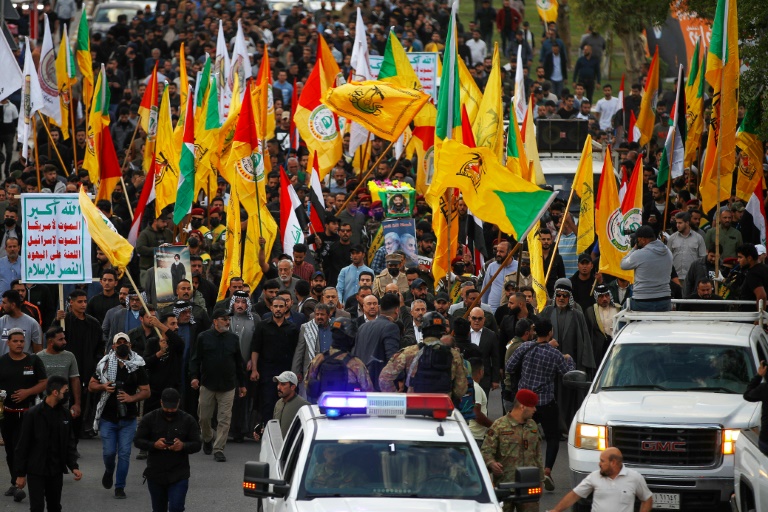Kataib Hezbollah calls for US troops to leave Iraq

Iraqi mourners in Baghdad carry the coffin of a Kataib Hezbollah fighter who was also part of the ‘Islamic resistance in Iraq,’ which has claimed recent attacks against US troops in Iraq and Syria, and who is believed to have died in a US air strike in November 2023
Baghdad – Iraq’s powerful Kataib Hezbollah on Tuesday renewed its call for US troops to withdraw from Iraq, months after the Iran-backed armed group suspended attacks against American forces.
Washington and Baghdad have been engaged in talks over the presence of US troops in Iraq, who are stationed there as part of an international anti-jihadist coalition.
A spokesman for Kataib Hezbollah said in a statement that the group “did not perceive the American enemy’s seriousness in withdrawing the troops and dismantling its spy bases in Iraq”.
“We also haven’t seen the necessary seriousness from the Iraqi government to remove them,” the spokesman, Abu Ali al-Askari, added in a statement.
The United States considers Kataib Hezbollah a “terrorist” group and has repeatedly targeted its operations in recent strikes.
During more than three months, as regional tensions soared over the devastating Israel-Hamas war in Gaza, US troops were targeted more than 165 times in the Middle East, mainly in Iraq and neighbouring Syria.
The Islamic Resistance of Iraq, a loose alliance of Iran-backed groups including Kataib Hezbollah, had claimed the majority of the attacks.
But a deadly drone attack in late January triggered retaliation, with US forces launching dozens of strikes against Tehran-backed groups, including Kataib Hezbollah.
Three US personnel were killed in the January 28 drone strike in Jordan, near the Syrian border.
Two days later, Kataib Hezbollah said it was suspending its attacks on US forces.
In February the United States and Iraq resumed talks on the future of the US-led coalition’s presence in Iraq, following a request by Iraqi Prime Minister Mohamed Shia al-Sudani who has been calling for an end to the coalition’s mission.
The United States has some 2,500 troops in Iraq and 900 in Syria as part of the international coalition against the Islamic State (IS) group.
The coalition was deployed to Iraq at the government’s request in 2014 to help combat IS, which had taken over vast swathes of Iraq and neighbouring Syria.
